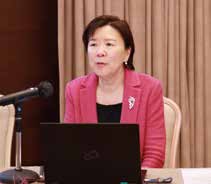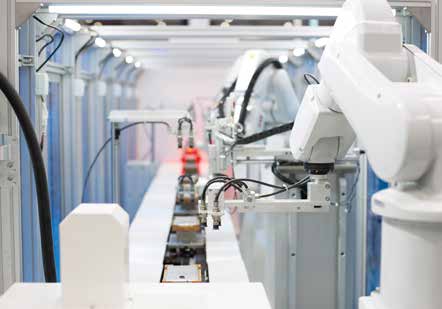As expressly mentioned in the “14th Five-year” Plan, Hong Kong will be supported to develop into an international innovation and technology (I&T) hub. Integration into National overall development, thus, is of utmost importance for the future of Hong Kong, the Guangdong-Hong Kong-Macao Greater Bay Area (Greater Bay Area), and the country.
 Contents in the “14th Five-year”
Plan will create a profound impact
on the I&T industries of Hong Kong.
According to Nancy Ip, Vice-President for
Research and Development, Hong Kong
University of Science and Technology,
Hong Kong must make the best use of its
strengths, actively foster cross-disciplinary
research, and integrate into the National
overall development.
Contents in the “14th Five-year”
Plan will create a profound impact
on the I&T industries of Hong Kong.
According to Nancy Ip, Vice-President for
Research and Development, Hong Kong
University of Science and Technology,
Hong Kong must make the best use of its
strengths, actively foster cross-disciplinary
research, and integrate into the National
overall development.
Capitalizing on own strengths
Ip pointed out that Hong Kong must gain in-depth understanding about the “the 14th Five-year” policy and seize the relevant opportunities. She reckoned that the central government is placing a greater emphasis on I&T and expressly supporting Hong Kong’s development into an international I&T hub. Indeed, Hong Kong can continue to play its role as an important node in China’s international cycle through I&T development. Such contribution is not only a service for the country but could also help Hong Kong achieve sustainable economic development.
She added that the central government and the HKSAR government are gradually implementing policies that are conducive to I&T development in recent years. For example, the scientific and research funding that was remitted to Hong Kong in 2018 has lent strong support to our scientific research sector. She commented, “As the home to a number of world top-100 universities, Hong Kong should value its strength in basic research – the source of innovation.” She hoped that Hong Kong’s universities spearhead the development of research and technology in the Greater Bay Area.
Joining up with Greater Bay Area cities in developing technology and research
 Speaking about the Greater Bay Area,
Ip opined that the construction of an
international I&T hub is a priority mission
for the Greater Bay Area’s development,
as much as it is a rare opportunity. She
explained that the current term of HKSAR
government has already invested more
than HKD13 billion on I&T. Therefore, Hong
Kong’s talents should strengthen their
I&T collaboration with other Greater Bay
Area cities. They should also contribute
by supporting whatever is needed by
China and by opening up more space for
development for themselves.
Speaking about the Greater Bay Area,
Ip opined that the construction of an
international I&T hub is a priority mission
for the Greater Bay Area’s development,
as much as it is a rare opportunity. She
explained that the current term of HKSAR
government has already invested more
than HKD13 billion on I&T. Therefore, Hong
Kong’s talents should strengthen their
I&T collaboration with other Greater Bay
Area cities. They should also contribute
by supporting whatever is needed by
China and by opening up more space for
development for themselves.
Ip quoted the case of relaxing the limitation on exporting Mainland human genetic resources to Hong Kong and Macao a few years back, pointing out that connection and cooperation between the two places have fostered technology and research development. She further emphasized that interdisciplinary cooperation is the key to promote I&T advancement. Noting the solid strength of Hong Kong in basic research and the vast Mainland market to support it, Ip commented there are huge opportunities available for scientists.
Next generation to benefit from Greater Bay Area higher education opportunities
 The HKSAR government has been
actively encouraging Hong Kong’s tertiary
institutes to offer education services in
the Greater Bay Area. Ip was glad to
see their accomplishments. She quoted
HKUST as an exemplary cradle, producing
outstanding I&T companies such as
DJI and Zhuhai Yunzhou Intelligence
Technology Ltd. The latter is now the first
enterprise dedicated to the research and
development of unmanned surface vessels
in China. HKUST’s integration into national
I&T development has been very successful.
Ip said that Hong Kong’s higher education
is making a presence beyond Shenzhen,
with many institutes tapping into other
Greater Bay Area cities to provide broader
room for development for local students,
and to create an even more promising
future.
The HKSAR government has been
actively encouraging Hong Kong’s tertiary
institutes to offer education services in
the Greater Bay Area. Ip was glad to
see their accomplishments. She quoted
HKUST as an exemplary cradle, producing
outstanding I&T companies such as
DJI and Zhuhai Yunzhou Intelligence
Technology Ltd. The latter is now the first
enterprise dedicated to the research and
development of unmanned surface vessels
in China. HKUST’s integration into national
I&T development has been very successful.
Ip said that Hong Kong’s higher education
is making a presence beyond Shenzhen,
with many institutes tapping into other
Greater Bay Area cities to provide broader
room for development for local students,
and to create an even more promising
future.




